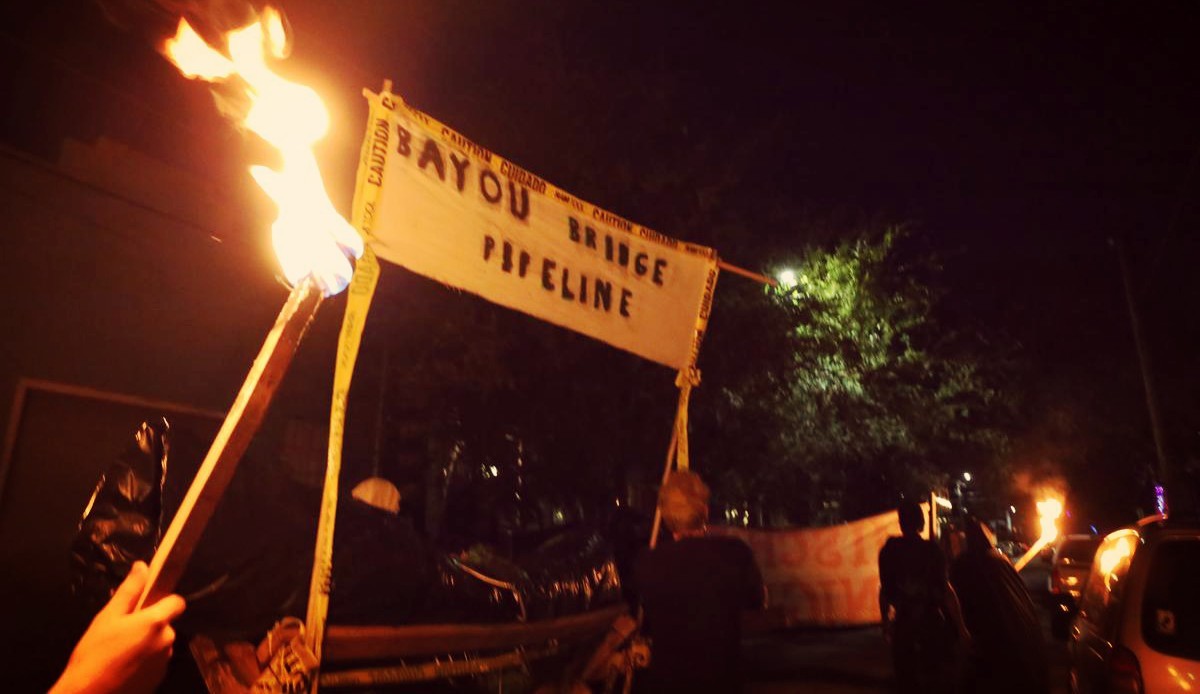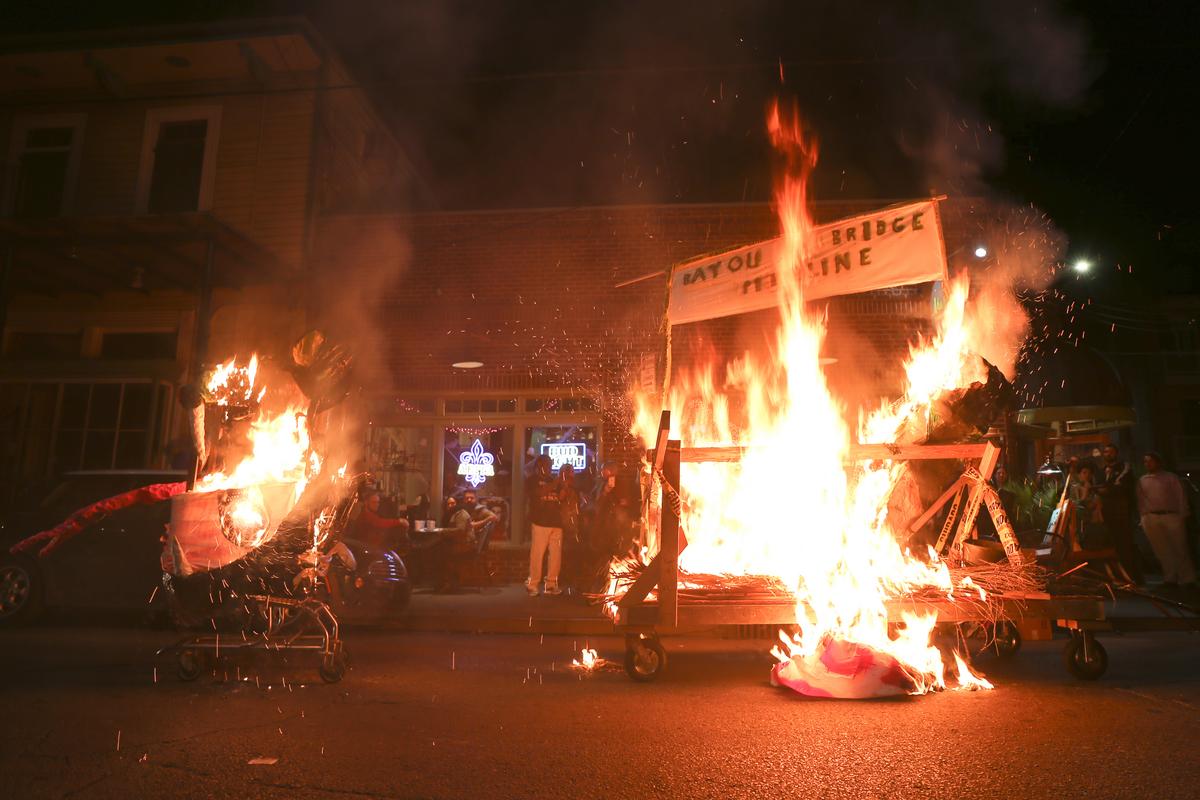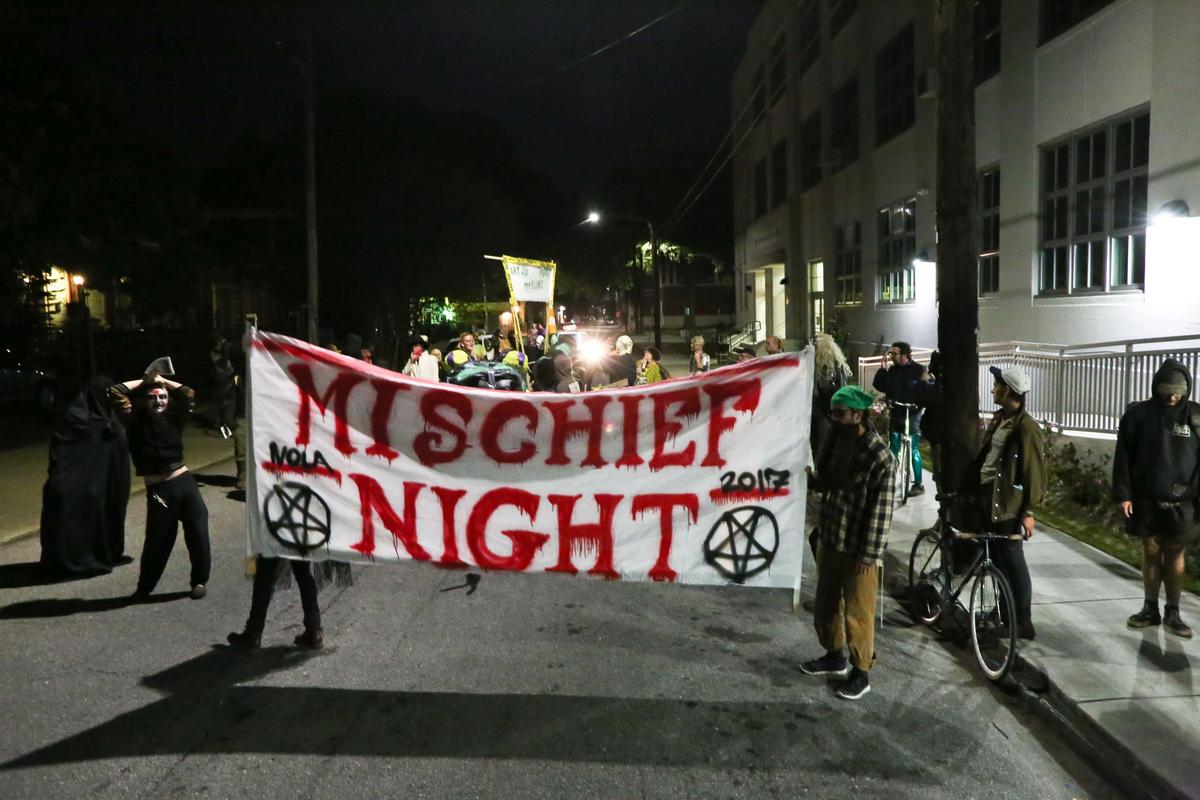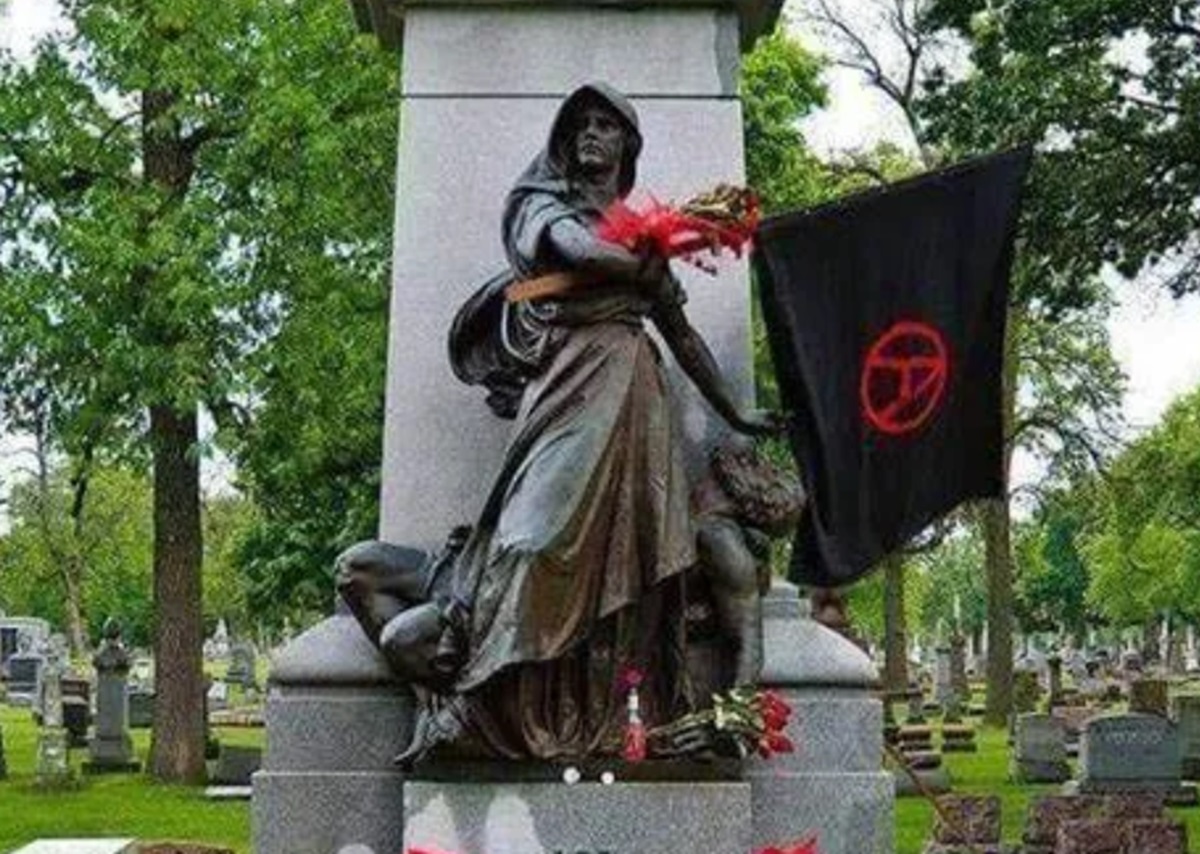Filed under: Anarchist Movement, Development, Environment, Featured, Interviews, Southeast, Video

‘Mischief Night’ refers to the long history of rebellious proletarian revery that has occurred throughout the ages around the time of Halloween. In the following interview, someone talks with people in New Orleans, LA, who for the last four years have taken to the streets to celebrate, and in turn discusses the history of the holiday as well as how people are taking it into an anti-political directions.
This year marked the fourth annual New Orleans Mischief Night Parade. Last year’s rowdy and daring procession down Canal Street ended in a bonfire and the defacement of a racist artifact (rest in pieces). The theme this year was the Bayou Bridge Pipeline, and the parade ended in a large black snake float burning in effigy on Frenchmen Street. Following Halloween, we caught up with some true Mischief Night revelers for an interview. Here’s what they had to say…
Why did you guys take the time to make another parade specifically for Halloween, especially such an involved and risky production? What is the relation of Mischief Night to this particular holiday?
Orca Chomp: If you’re not familiar with the history of Halloween or how its customs have evolved in different eras, it’s worth looking into. But in the present tense, commercial holidays–all of them–flatten the most powerful affects–stuff like Fear, Love, Hope, Grief, Community (I could go on…) into safe units with safe and usually passive public traditions.
But all that stuff is important to us, not symbolically but actually important, vital, so we want to engage them in a different way. Actually, we need to. Especially fear. The world we live in has become a nightmare. It’s endless. The places we live are crammed with the most horrible bullshit and then it gets normalized in just a couple years. None of these things were being confronted to our satisfaction in other Halloween traditions like costume parties and big dazzling spectacles, so we had to make the Halloween that we need to exist right now.
Right, you’ve described elsewhere a sense of an imperative to “collectively build a more combative spiritual practice.” But why bother?
OC: If public traditions matter at all or have any consequences for the people who are in them or who see them, then they need to reflect what we actually feel and want. Being pretty isn’t enough for a lot of people. A halloween costume that’s a cynical joke about Trump or whatever is more sad than funny. To be stuck in that kind of flat, empty mode of passing through the morbid death holiday just bums us out even more. If we’re going to be out in public, we want to be out as ourselves–people who don’t want to put up with with the way things are or the way things are going.
It’s crucial and non-negotiable for us to have public traditions that are beautiful, that make us happy and where we get together and move through the real world actually confronting the things that actually scare us, and confronting them in the way that’s intuitive for us. Passively respecting the nightmare world around us as it stands… isn’t intuitive for us.
What was this year’s theme? How is the theme determined each year?
OC: I said earlier that Mischief Night is about confronting fear and confronting the things that scare us. We haven’t come up short yet thinking of something disturbing–maybe it’s been hard to know where to start. For instance, so there’s this project going on where these nihilist lunatics are trying to build an oil pipeline to connect Louisiana to this certain other oil pipeline built last year up north… Which has already leaked how many times? Three to date? Crossing 700 bodies of water and eminent-domaining people out of their land and for what? We all know where this is going. We all know what’s about to happen here. In spite of all different kinds of people fighting it in all these different ways, we’ve all seen what tends to happen. What it will probably come down to. Everyone knows… And in the back of our minds we’re partly thinking about it all the time. Those are the types of things that come up when we pick a theme.
But why a parade?
Flamingo Pox: Being in the streets gives people a sense of power over their lives and community. Being in the streets isn’t always enough, though. Protests and marches often fall short in terms of the connectedness, vitality, and collective strength we’re looking for and need. This is part of the sad amputation of politics from the rest of life. Whether or not it’s intentional, in most activist circles we’ve known, things such as resistance, strength and joy can only overlap in the most contrived ways, if at all. But we need the overlap of all these things in order to have a chance of developing any substantial counter-power.
Lots of traditions, too many to name, have always known this. In New Orleans, we’ve found the strength-joy overlap is more often found in parades than marches. Dancing atop buildings and cars, chasing off the police with bottles for trying to arrest someone, torching someone’s four-wheeler because they recklessly drove through the crowd and could’ve killed someone, all while dancing, singing and partying—basically until the Ferguson solidarity marches in 2014, such instances of real agency and happiness were things we’d only ever witnessed here in parades.
How do you see your parade in context with Carnival’s history or traditions?
“Boys should collect alms for the respectable poor, instead of mad pranks, throwing stones and making floats.” – Crusading Monk of Florence, 1490.
FP: Mischief Night is a breakaway of breakaway, but we recognize a concrete history that dates back centuries. Our Carnival traditions are those that actually want to “turn the world upside down.” There’s always been a push and pull between popular ways of celebrating and ways that established powers would like us to party and parade. For instance, the emergence of the Grand Krewes was an explicit reaction to elite fear of popular revolutionary violence on the eve of the Civil War. Walking parades are different than spectacular parades for a reason.
So what are the modern incarnations of this form of holiday?
FP: It is the dirt bike gang doing wheelies light after light down Canal Street with no license plates on a Sunday morning. It is an impromptu post-parade kegger throwing furniture off the roof of an evicted social center turned into luxury condos before pulling the fire alarm. It is launching from the sideline of Muses a full daiquiri through the half-opened window of an NOPD mobile command center as it drives by. It is tipping over those top-heavy “Mr. Tippy” spotlights the cops are trying to make ubiquitous during Carnival. It is thinking your parade is the only celebration on Mischief Night, only to find out on the 5 o’clock news the next day that apparently somebody else was out there setting dozens of dumpster fires.
Despite the completely insane extremes of control infiltrating every last corner of the world, our form of holiday, the kind repressed by Grand Krewes, has still never left the scene. Even broken up, these instances have never stopped occurring in the interstices of our otherwise commercially sanitized holidays and traditions. They’re rarely recorded as anything but aberrations, because they do not happen within the historical continuum of this runaway train we call progress. As Walter Benjamin watched fascism sweep Europe in the 30s, he put it well:
The awareness that they are about to make the continuum of history explode is characteristic of the revolutionary classes at the moment of their action. The great revolution introduced a new calendar. The initial day of a calendar serves as a historical time-lapse camera. And, basically, it is the same day that keeps recurring in the guise of holidays, which are days of remembrance.
What are some particular intentions of Mischief Night regarding this pipeline situation or a general trend of “resistance”?
OC: For lots of people, it’s not enough anymore to “demonstrate” being “against” something. It’s pretty clear at this point that it matters little to powerful parties how many people simply show up to “demonstrate” their opinion, as long as they keep it orderly. Case in point, the climate march, the women’s march…
FP: These were to the fossil fuels industry and the emergence of Trump what the anti-war marches were to Bush: not even a bump in the road.
OC: But on the other hand, if anything, one of the major valuable things about those kinds of situations is for people to get together and act together. That’s a vital thing regardless of the practical irrelevance of your “message” to your enemies. Parading together and confronting the horror that is our transforming world and the city that’s already been transformed, this isn’t the end-all, but it is just necessary.
Why this year’s route and why do things get broken and trashed? What do you say to those who lost business or had to clean up after Mischief Night? How Dare You??
OC: Trash? Trash? Did somebody say trash?
FP: More trashing is what the world needs—there’s so much trashing to be done! We need judicious trashing, and more bonfires too. What we don’t need is more business. Reality is not a set of economic relations, no matter how many apps and entrepreneurs find ever more subtle ways to valorize the human experience. And insofar as economic relations now account for a lot of what passes for human connectedness, it is always at our expense, forced upon us over of centuries of the most extreme dispossession. All economy is manufactured scarcity. All economic relations are separation. And separation is the reason this world is shit. The only way to head off this disaster is with disruption—that is why more trashing needs to happen.
Sorry-not-sorry to the business owners and their admirers on Frenchmen. We recognize the necessity of doing business just to survive in this world—but when another world roars into existence just feet away and for a moment wrests space from the market, we recommend moving towards and not away from its warmth.
Like other walking parades, Mischief Night entails an informal flow of people jumping in and out of the procession. How do you envision the relation of participants to spectators? Is this even important to you?
OC: It goes without saying that the parade is the people who bring the parade. That’s the old-old form of parade. What’s a little more uncommon in this time of big “protest” marches is being able to open up something that isn’t like a march or demonstration, and also isn’t entertainment or intended to be symbolic or cathartic. Instead you have the bulk of people making choices about what they want to happen, and shaping what happens, so that anything can happen. Of course everyone gets to be in the street, that’s just basic, but what we love about Mischief Night is that each of us picks our own mischief.
Of course, there are lots of people around these days who would rather stand aside and film instead of parading. If that isn’t you, come party with us next time.







